How A Team-Level Agile Mindset Shapes Team Effectiveness
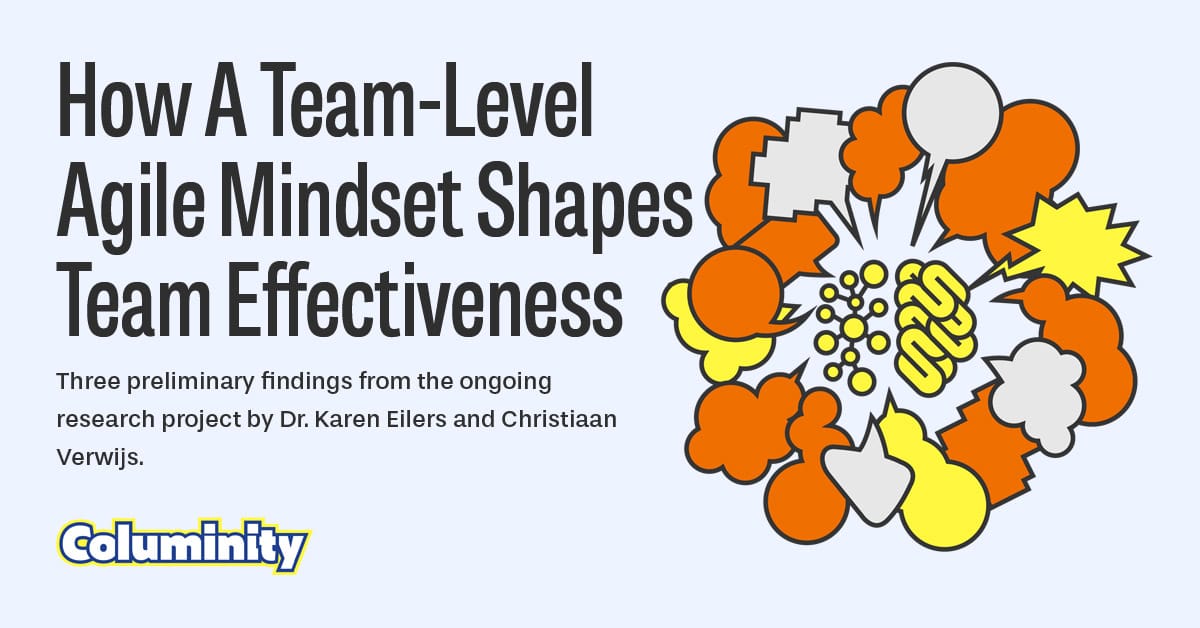
What makes Agile Teams effective? Is it the presence of roles like Scrum Masters and Product Owners? Is it the use of concepts such as Product Backlogs or Sprints? Or it something deeper, less tangible?
In this post, we share preliminary findings from an ongoing research project into Agile Mindset by two members of the Columinity Science Team, Dr. Karen Eilers and Christiaan Verwijs. Our core findings are:
- Agile Mindset is a useful concept at the team-level, and consists of shared beliefs about learning spirit, collaborative exchange, customer co-creation and empowered self-guidance.
- Teams with an Agile Mindset seem to be more effective.
- Cross-functionality, psychological safety and value focus contribute to Agile Mindset.
- Management Support creates a foundation for Agile Mindset.
Below, we expand on how we arrived at these findings. You can also scan the Agile Mindset in your team right now to get a detailed evidence-based report for free:
How Agile is the mindset in your team? Receive a detailed report and contribute to ongoing scientific research
Agile, behaviors and attitudes
Agile is first and foremost the ability to learn and adapt quickly. This can be a response to changing market conditions, customer needs, emergencies or other needs. Within organizations, Agility can manifest at different levels. Teams are agile when they learn and adapt quickly about the work they need to do. In turn, organizations are agile when their structures, processes and culture allow them to learn and adapt quickly to their environment.
While agility may be encouraged through the introduction of roles, events and concepts, such structural changes alone rarely seem sufficient. Not surprisingly, many Agile transformations fail to achieve their aim (e. g. Dikert et al. 2016, Sutherland 2020; Digital.ai 2023).
Scientific studies have investigated why this is so. One study by Verwijs & Russo (2023) considered behavior typical to agility, and found that behaviors relating to stakeholder concern, responsiveness, continuous improvement and team autonomy explained up to 76% of the effectiveness of agile teams. This is now the "Agile Team Effectiveness" model in Columinity.
However, behavior does not occur in a vacuum. Psychologists like Ajzen and Fishbein (1980) have pointed out that behavior is shaped in a large part by personal beliefs or attitudes. In other words, it is not enough to tell teams it is important to collaborate with stakeholders - they have to believe it to be important.
An interesting perspective on this is offered by research into the Agile Mindset. Eilers, Peters, and Leimeister (2022) focused their research on demystifying the Agile Mindset. Based on previous literature and expert interviews, they identified four dimensions of the Agile Mindset to make this attitude more tangible for practice. The Agile Mindset, therefore, represents a positive attitude towards:
- Learning Spirit,
- Collaborative Exchange,
- Customer Co-Creation, and
- Empowered Self-guidance.
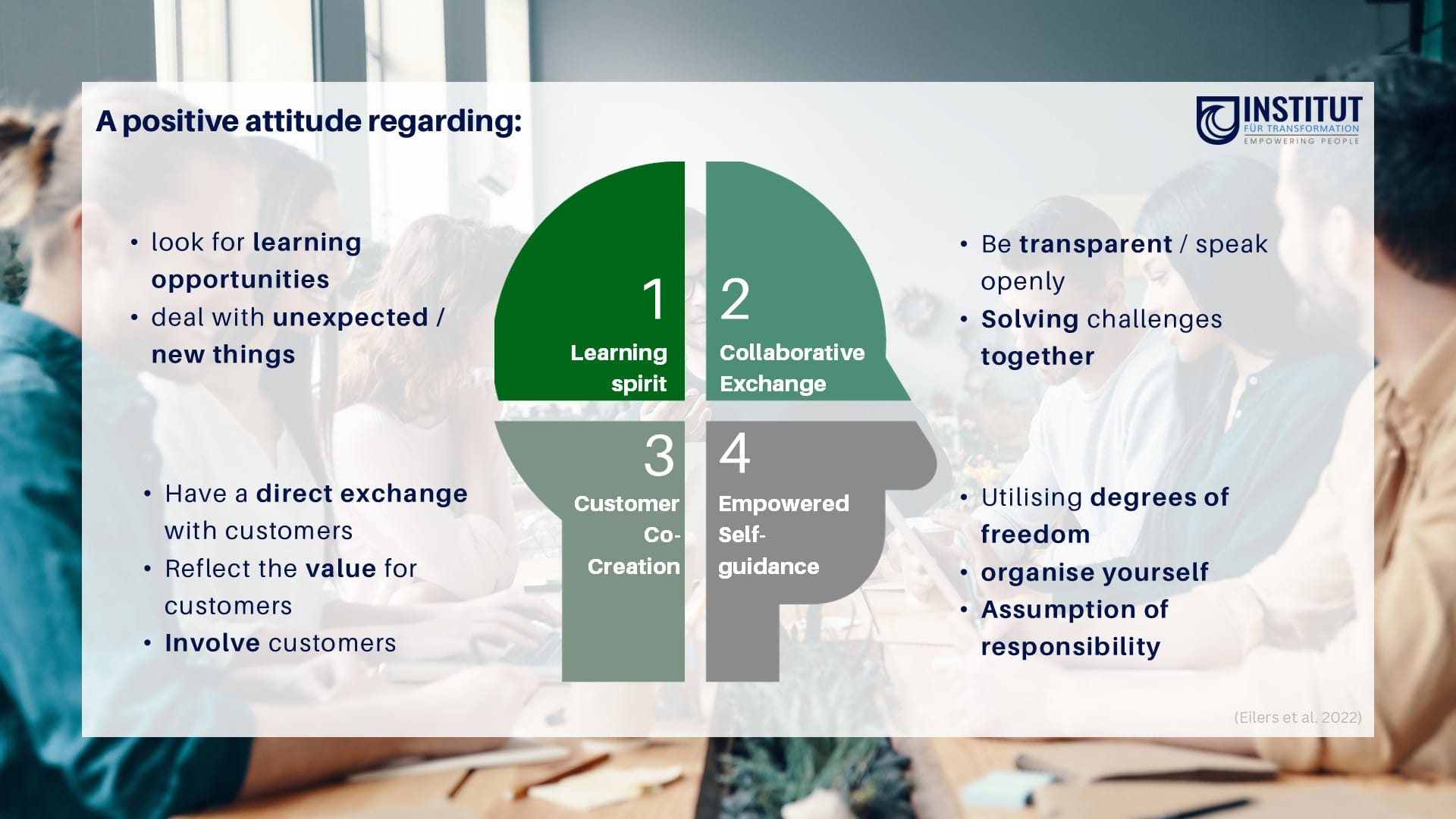
They developed a scale to measure the Agile Mindset at the individual level. Other researchers built on their work and found that the Agile Mindset predicts higher innovative work behavior and performance, as well as lower emotional exhaustion (Augner & Schermuly, 2025). Further studies have provided insights showing that creating suitable environments can help people develop an Agile Mindset based on their positive experiences when they act in accordance with this mindset. These environments include:
- Knowledge impulses for continuous learning and openness,
- Work design that supports, for example, reflection through retrospectives and enables people to choose their own way of achieving goals, and
- Leadership that fosters collaboration, ownership, and learning.
Research Project: Agile Mindset at the team-level
Previous studies focused on Agile Mindset of individuals. Because most work in modern organizations happens in teams, we wanted to adapt it to the team-level. This recognizes that behavior in teams is shaped by the extent to which such beliefs are shared by members, and members are aware of this. This requires open and honest conversations in teams. Therefore, the aim of this research project is to empower teams to become more effective by continuously developing their Agile Mindset through meaningful conversations.
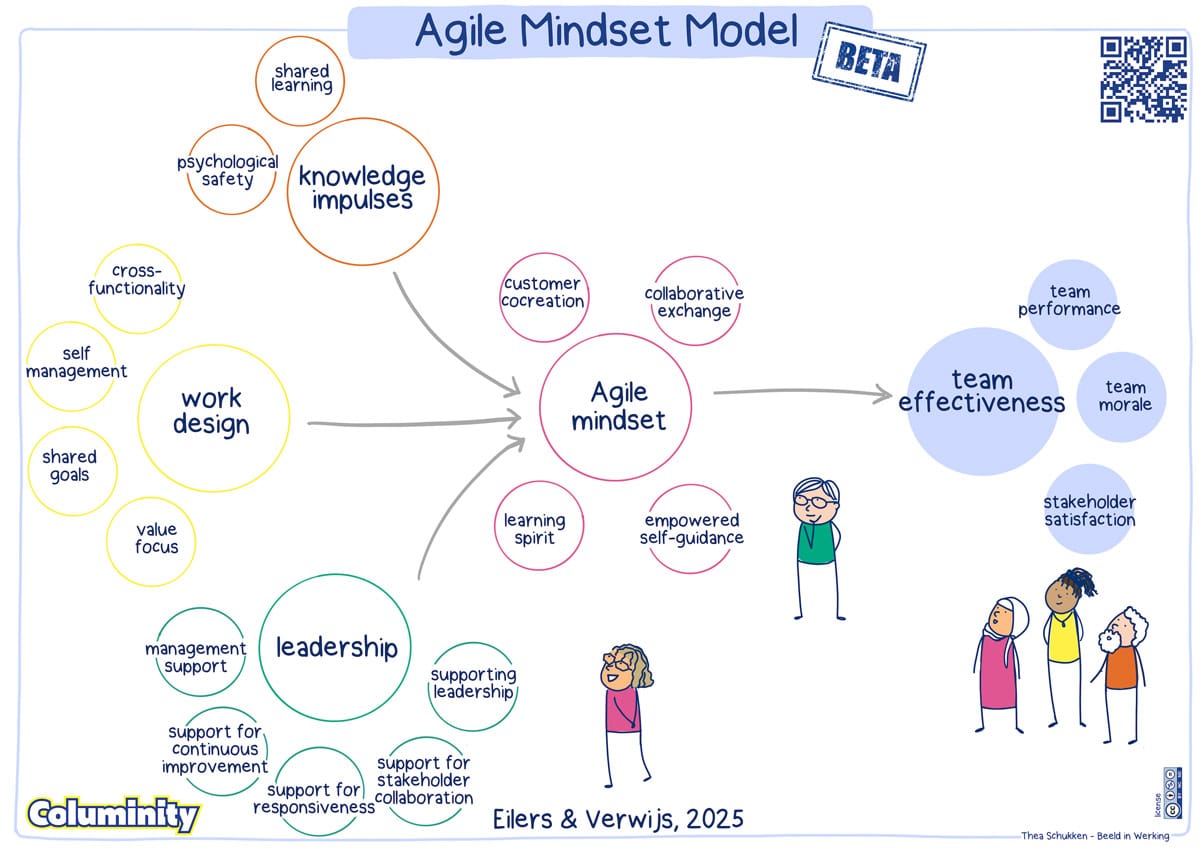
How we analyzed the results
We began our collaboration by developing a set of survey questions to measure Agile Mindset at the team-level. These questions were deployed through Columinity as part of the "Agile Mindset"-model.
The collected data was cleaned of low-quality responses, resulting in 133 respondents of 55 discrete teams. In this first validation, scales were evaluated with Confirmatory Factor Analysis (CFA), reliability analysis, Heterotrait-Monotrait analysis (HTMT) and content analysis. We used Structural Equation Modelling (SEM) in IBM AMOS to test the measurement model. Missing data was imputed and we controlled for social desirability bias in the answer patterns. Finally, a path model - an advanced form of multivariate regression analysis - was developed to test direct and indirect effects.
Does Team-Level Agile Mindset Consist of 4 Dimensions?
A first test was whether or not we could indeed find four distinct dimensions for Agile Mindset in the data. We started with data from 20 questions from 4 scales, one for each proposed dimension. After removing questions that overlapped too much between dimensions, we arrived at a set of 13 questions that resulted in four discrete, but correlated, dimensions. The resulting fit was good (CMIN=103.828, Df=59, CFI=.966, TLI=.955, RMSEA=.076). The modified scales also showed excellent measurement reliability, exceeding .80 (Cronbach's Alpha).
In practice, this means Agile Mindset manifests in teams through four separate, but connected, factors.
Preliminary Finding #1: Teams with an Agile Mindset seem to be more effective
Our first hypothesis is that teams with an Agile Mindset are more effective than teams without. This appears to be the case. We analyzed responses from 133 teams (55 teams) and found that team effectiveness goes up by .69 points for each increase of 1 point for Agile Mindset (on a scale from 1 to 7). This effect was statistically significant.
This means that teams that value Customer Co-Creation, Collaborative Exchange, Self-guided learning and Empowered Self-guidance are generally more effective than teams that do not. They show higher performance, higher team morale and higher stakeholder satisfaction.
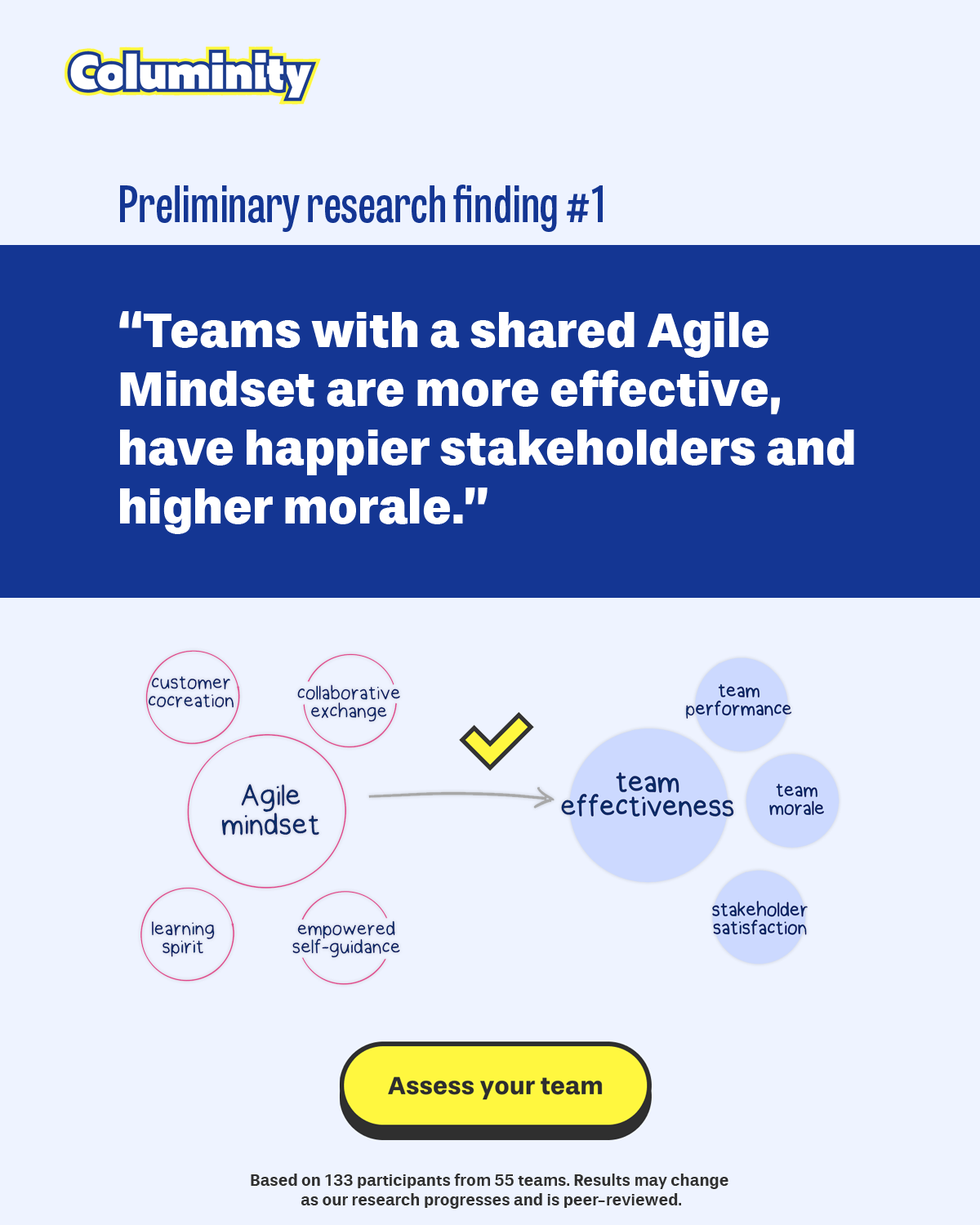
Preliminary Finding #2: Factors that contribute to Agile Mindset
What contributes to the formation of an Agile Mindset? Insights into such factors can help us better understand why some teams develop an Agile Mindset, and become more effective, while others don't.
We hypothesized several factors. Of these, three showed a statistically significant direct effect on Agile Mindset. First, teams that are cross-functional show a higher Agile Mindset. For each increase of cross-functionality by 1 point (on a 7-point scale), Agile Mindset increased by .33 points. Second, teams that perform work where the value is clear to them showed a higher Agile Mindset. For each increase in value focus by 1 point (on a 7-point scale), Agile Mindset increased by .31 points. Finally, Agile Mindset is higher in teams where members can take interpersonal risks without repercussion (i.e. psychological safety). For each increase of psychological safety by 1 point (on a 7-point scale), Agile Mindset increased by .56 points.
Of the factors we hypothesized, the presence of shared goals, high autonomy (self-management) and the presence of clear learning opportunities did not statistically contribute to Agile Mindset with this sample.
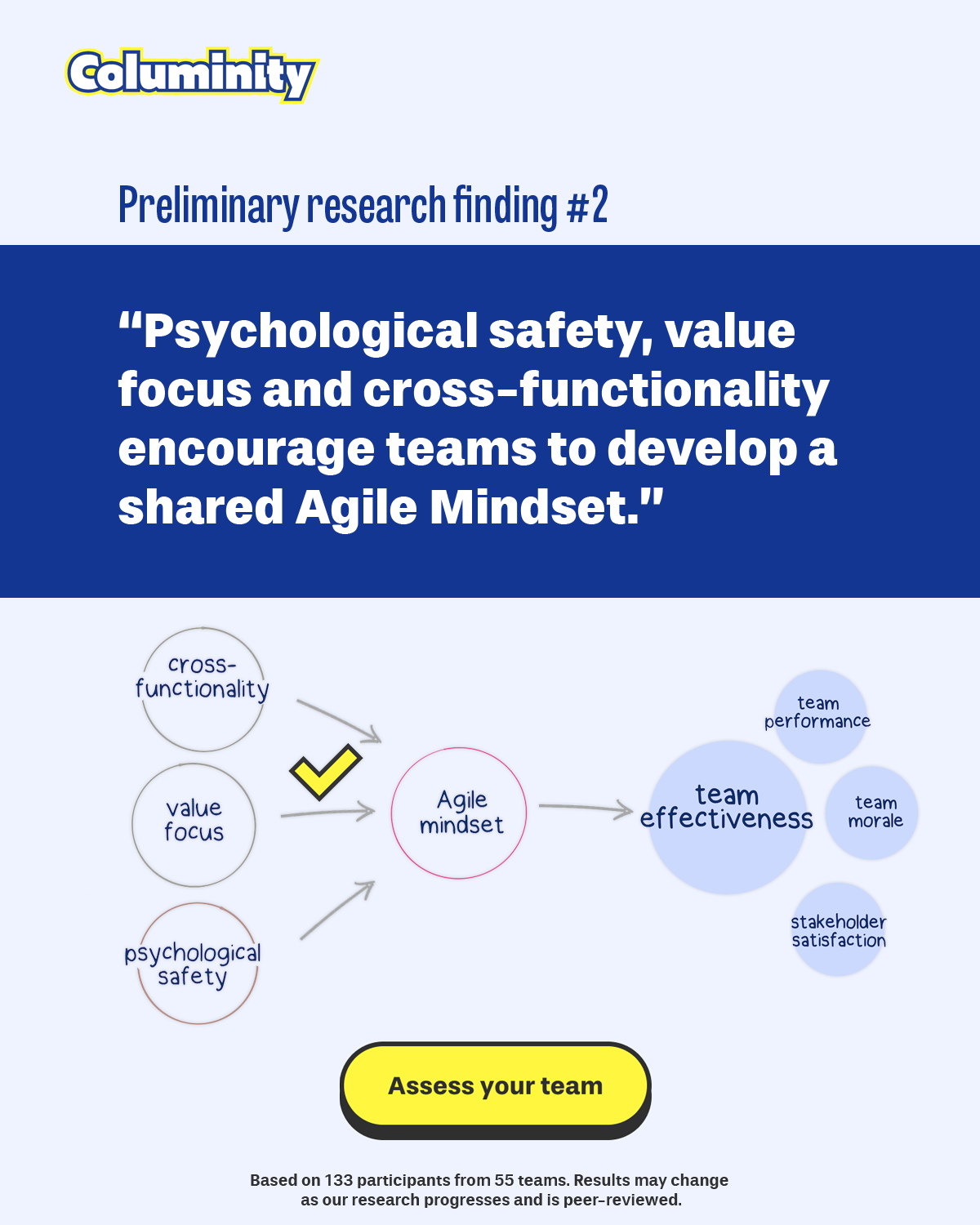
Preliminary Finding #3: Management Support creates the foundation for Agile Mindset
What role can management play in the formation of an Agile Mindset? Although management support does not directly influence Agile Mindset in our sample, its effects are indirect.
In our results, we can see that management support positively influences cross-functionality, value focus and psychological safety, and thereby increase Agile Mindset indirectly. In this way, each increase of management support by 1 point (on a 7-point scale), contributes to an increase of .38 points in Agile Mindset. This clearly shows that management support helps establish the foundation for teams to thrive.
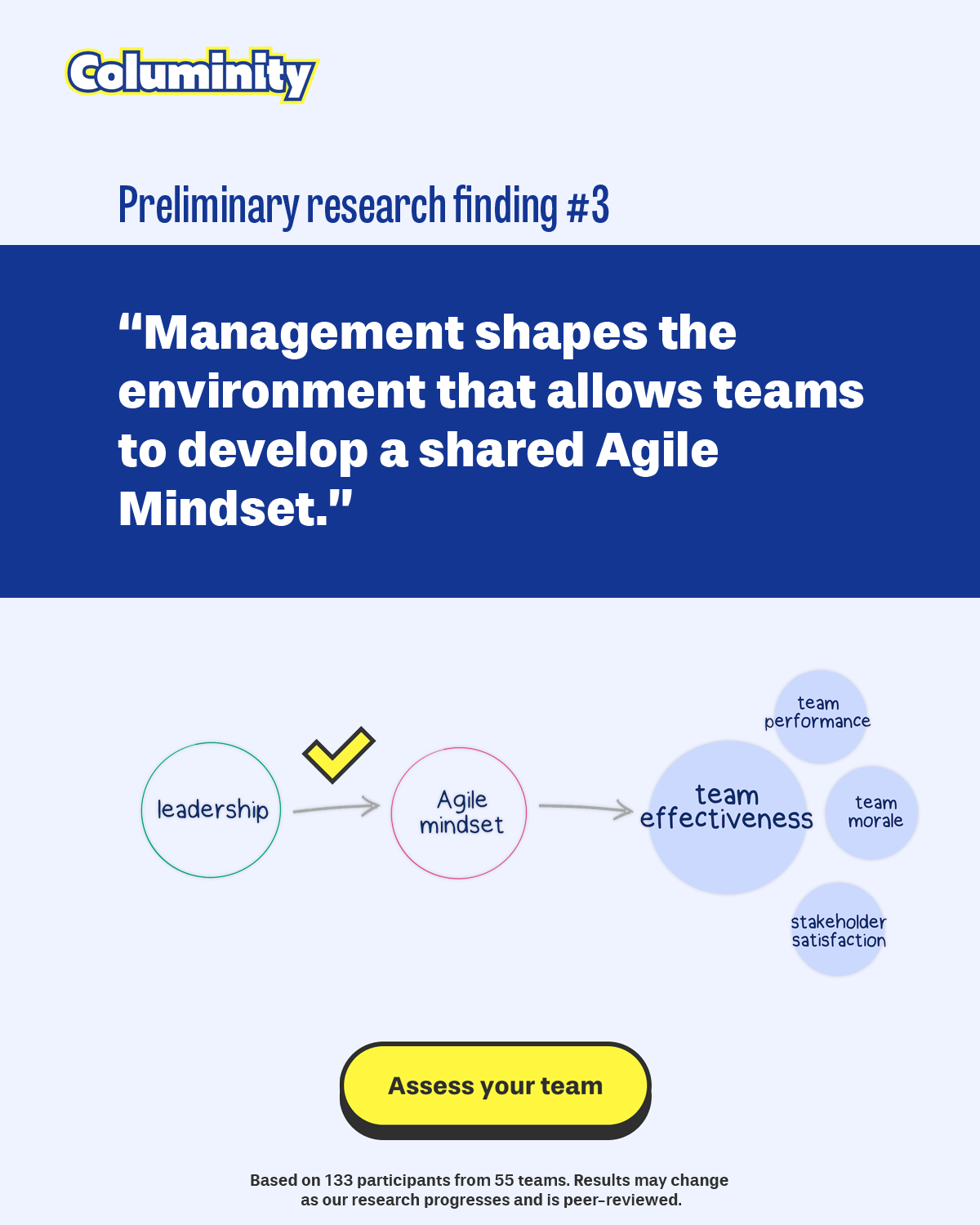
Limitations
Our research project is in the early stages. We are openly sharing our preliminary results here to show the value of such research. However, there are several limitations to take into account:
- Our dataset is still modest in size with 133 participants. Small samples have more statistical noise, which makes it harder to detect effects.
- Stakeholder satisfaction is important aspect of team effectiveness. We are currently relying on self-reported measures by teams, which may be biased. However, we are collecting feedback from stakeholders directly. This sample is still too small to meaningfully analyze though.
- We are still learning how to best measure Agile Mindset on the team-level. The scales we developed will change as we learn how to more accurately measure it, which may change the results.
Next Steps
This post reflects the first step in a three-step validation process. We've used insights from this step to make changes to the survey. The next validation will be performed on a larger sample, hopefully 500+ participants. The final validation will be performed on the largest sample, hopefully 1.000+ participants and result in an academic paper that will be submitted for academic peer review.
Help Us Continue This Research
If you find research such as this valuable, please contribute to it yourself or encourage others to do so. The best way to contribute is to scan the Agile Mindset of teams in your organization through Columinity. You can participate with full anonymity. No account and no payment is needed. We use anonymized data for our scientific research.
Once we have more results, we will report back here with the findings.
How Agile is the mindset in your team? Receive a detailed report and contribute to ongoing scientific research
Authors
Christiaan Verwijs, Organizational psychologist at the Lucid Institute of Organisational Research, and developer and co-founder of Columinity.
Dr. Karen Eilers, Business psychologist at BSP Business and Lawschool in Hamburg, with a Ph.D in Information Systems.


